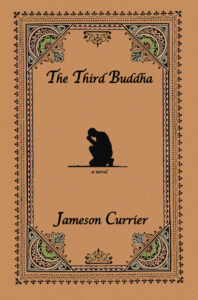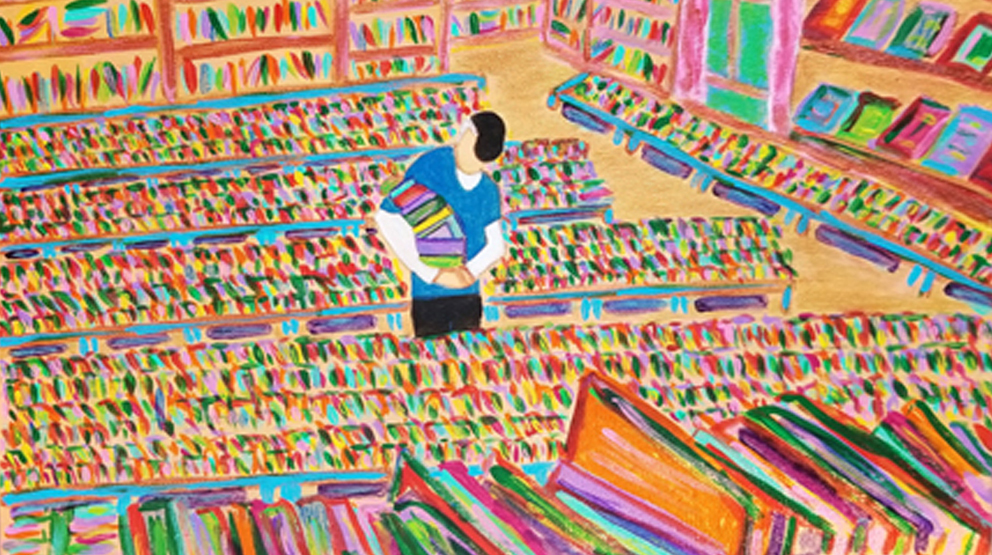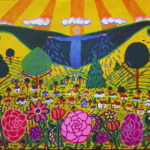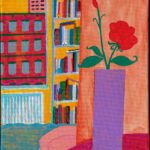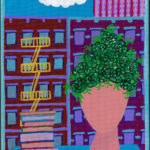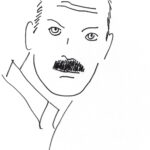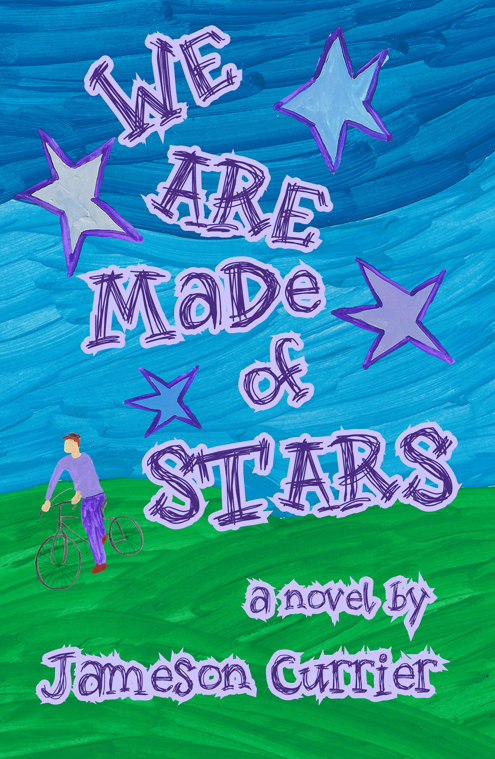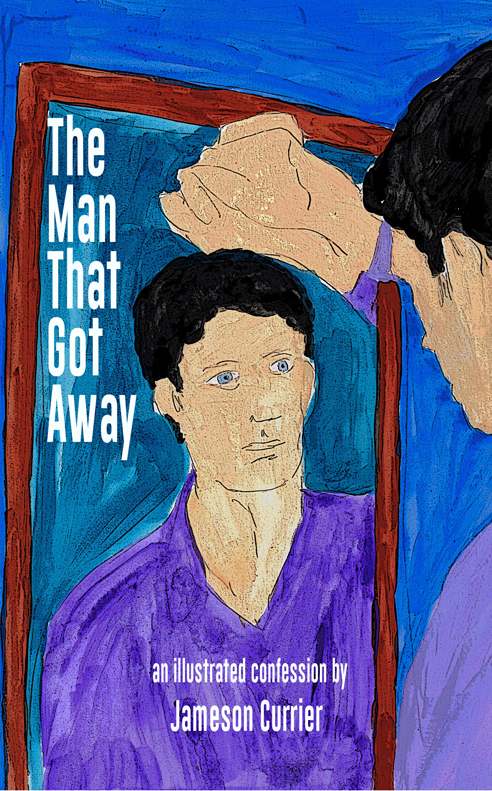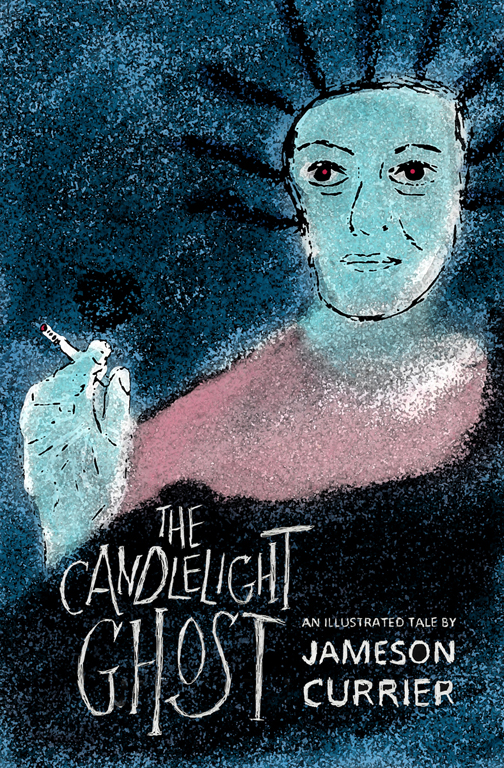from The Third Buddha by Jameson Currier
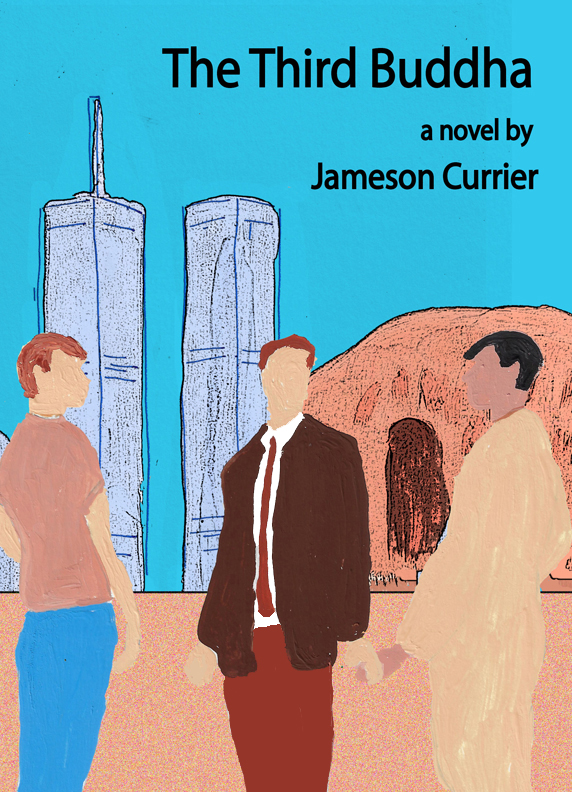
September 2001
I was in my first weeks of law school in Philadelphia when the planes hit the World Trade Center in September, 2001. I was already knee-deep in reading and study groups, struggling not only with the lessons and the law but with whether my choice to pursue them was a mistake. I had realized very quickly that I no longer had the enthusiasm for more schooling, burned out from finally getting a dual bachelor’s degree in history and American studies only a few months before, and I had a professor who had singled me out for abuse within my first days of classes. “Mr. Breed-gees,” he purposely mispronounced my name, “I doubt you have the depth of understanding to be a criminal attorney. I suspect if you last the entire semester, you should consider one of the corporate fields. Something less ambitious and career defining.”
The truth was that I was longing to be anywhere but in a library reading and studying and arguing case points. Instead of Philadelphia, I should have volunteered for one of those adventurous foreign jobs, like building a hut in Kenya or helping flood victims in China, something more absorbing and engaging and “hands-on,” but I was also not yet ready to admit that my law school decision might have been a big mistake, even though it was clear to others that it already was. At issue was also the respect I wanted of my parents—they had encouraged me in this path and I did not want to disappoint them by giving up on it so soon.
Within minutes of the impact of the plane on the South Tower, my father had called me on my cell phone. He had been unable to reach my older brother, Philip, who worked as a broker at the World Trade Center, and there were news reports that a fire had started in the upper floors of the building. I was seated in a classroom at the time, nursing a cardboard cup of coffee as the professor was beginning a lecture on “criminal structures,” when I felt the vibration of my cell phone and saw my father’s phone number tick across the screen. My heart tumbled; I knew something was wrong. My first impression was that it had everything to do with my mother—why else would he be calling me so early in the morning? I let the call go into voice mail, saw the little envelope appear on the screen indicating a message had been left, and fidgeted and sweated and worried as I listened to the lecture and attempted to take notes. About the same time, I noticed another student across the room checking his cell phone, then a student who worked as a part-time secretary in the administrative office burst in through the door, saying, “The Trade Towers have been hit!”
I knew instinctively that this was a moment I would always remember as the girl lifted her hands to her face to show her horror. Where were you when the news broke? How did you hear about it? What were you doing? What was your reaction?
The professor, a former district attorney and a Second Circuit court judge, briefly cross-examined the student-secretary in a hushed, calm manner—Trade Center? New York? Wall Street?—and then quickly dismissed the class. I knew now in my gut that my father’s phone call had nothing to do with my mother and everything to do with my brother.
I was not estranged from my brother, but we were also not close; our lives had very little orbits around each other. Philip was thirteen when I was born, entering his teens and an older, adult world, and I often fantasized when I was growing up that I was an only child, only to be startled by a comment from one of my parents about something Philip had said to them and the realization that somewhere out in the strange world beyond St. Louis, I had an older brother who lived and studied and worked and loved and had life issues. He was not out and open about his homosexuality with my parents, or at least I was not aware of it until I turned twelve and I caught my mother crying on the stairs one morning, her head bowed towards her lap. When I asked her what was wrong, she said, “You brother is just giving us some problems, Teddy. We’ll be alright. Your father will talk to him about it.”
Later, I overheard snippets of my parents’ conversation with each other and felt a deep shame about my brother’s sexuality, even though I understood little of what it was about. I had read about “gay men” and the “growing rate of AIDS infections” in the books and magazines in our neighborhood library and felt a deep fear not only for my brother but also for myself. What if I was the same sort of man as he was? Weren’t we related, after all, made up of the same genetic framework? If he were gay, what did that mean about me?
My brother was not a sissy, or at least I have no memory of clues to that. He did not lisp or flap his hands when he spoke or play with dolls. To my knowledge he never dressed up in my mother’s clothes or tried her make-up on while she wasn’t looking. He did not fit the stereotypical image of a gay man that I held in my mind from having watched TV sitcoms and re-runs as a boy. Philip was incredibly bright—in high school he had aced chemistry and physics and was president of the Math Club, though he was also not a geek. He played trumpet in the school band, which made him popular with both jocks and girls, and was co-captain of the tennis team, a sport which demanded little practice so he could do other things. My parents were always quick to let me know that something I was doing—or choosing—was also something that Philip had enjoyed doing—or not doing. He had organized paper drives for fundraisers for new gym equipment, sold doughnuts door-to-door to raise money for new band uniforms, and once he had gotten his driver’s license, volunteered with a library cart at a nursing home not far from school.
I had stumbled my way through high school. I had done poorly in geometry and worse in economics, though I had enjoyed World History and Civilization. I was slow learning to use a keyboard on the computer and was too uncoordinated to do gymnastics. I hated going to church or Bible camp or practicing trombone, which I gave up my sophomore year because I thought I could play football. I made the team as a receiver and played the first two games—until I kept dropping the ball too often and sat on the bench for the rest of the season and never tried out for the team the following years. After school, I held various jobs at the nearby mall—a cashier at a fast food restaurant, a clerk at a vitamin store, and a waiter at a small café. But it always seemed that my ambitions were small when compared to my brother’s achievements.
But more than that I resented my brother’s intrusions into the simple organization of our lives—we had to miss the broadcast of The Breakfast Club to meet him at the airport, dine as a family at the Red Lobster instead of shooting pool with my friend Brian in his basement, drive together to the nursing home to visit my grandmother instead of sitting with Craig in his bedroom listening to music. By then I was a self-absorbed teenager, wanting only to go in my own direction or that of my friends. That my brother only appeared during the holidays was often a relief—he showed up alone, smoked cigarettes in the driveway, and drank bottles of wine he sneaked into in his bedroom in a knapsack—and his interaction with the family was awkward and strained. My mother was desperate to know details of his life, though she did not wish to hear of Philip’s dates or boyfriends or anything to do with his being gay or having sex with other men. She asked him about seeing plays and Broadway musicals, the exotic trips he had taken, while my father tried to pin him down on investment advice, which he was always reluctant to give. Once Philip made a casual remark about dating an older man and I saw my mother’s face fluster and redden and she excused herself from the room, but later I heard her tell Philip that “We haven’t told anyone about it outside of the family. We thought it should be kept private.” Whenever I heard a classmate call another one a “fag” or “homo” in jest or ridicule I felt a deep burning shame because I could not step forth to defend my brother either. But the true fact of it was I studied my brother on those visits home—I watched the way he held his fork and chewed his food and swallowed, admired the way his hair was cut and styled, memorized the words and phrases he used to describe something he liked as fab-u-lous or marv-e-lous, and the way he cleared his throat and laughed at something he found ironic or funny. His characteristics were eerily similar to mine, but he had seemed to sail through his teenaged years without all the strife I was experiencing. After he left to return to his own world, I would spend hours in his bedroom snooping through the stuff he had left behind when he first left home for college and which my mother had never cleared away or discarded—his old sweaters and jackets, the weathered science fiction paperbacks, the messages written in the corners of the photos of his yearbook from his friends—“Philip, I would never had made it through calculus without you sitting in back of me. You are a true friend and I will really miss you and hope we stay in touch, Love, Marci.” and “That was a great time we had together on the band trip to Chicago. You rock! Steve.”
I avoided “coming out” to myself and my parents in the same way my brother had done for so many years, to avoid seeing and hearing their disappointment. But being like my brother did not make us any closer. I was twenty-three years old on the day the Towers fell. I had only slept with two men. There was not much to tell about myself, except that I had a deep fear of who I would find when I started to look.
When I stepped out of the classroom and called my father back, I heard the strain in his voice immediately. “Teddy, you’ve heard?” he asked.
“I don’t know all the details,” I answered. “Did you hear from Philip?”
“No,” he answered. “Your mother wants you to get to New York as soon as possible.” My mother was always complaining that Philip and I were not close enough, as if by bringing us together in the same physical space she might be able to accept more readily the secretive details of his life. She had encouraged me to visit him in New York during the summer months before I began law school, but when I had asked Philip about staying with him, he had given me some excuse about being in Africa for a vacation and I dropped pursuing the idea, though a week before the terrorist attack he had sent me an e-mail that he was planning to be in Philadelphia for a business conference and did I want to get together for dinner and we had set a tentative date.
But I was angered by the realization that Philip was not recognizing the possibility that I was also gay—that he seemed so uninterested in my life—or my life when it only intersected with his. The Prodigal Son and Good Samaritan wasn’t a decent brother to his own brother.
“Why?” I asked my dad. “What’s going on?”
There was a pause in my father’s voice as I heard him say something to my mother. They were watching a television news program, most likely on the small set with the worst reception in the den of our house.
“Do you remember what floor Pup said he worked on?” my father asked me. Pup had always been my brother’s nickname; since a boy he had demonstrated a handsome, masculine, playfully personality—the kind of guy ready to go out to play tag football or wake up early to head to the creek to fish. “Pup” seemed to fit him perfectly. My parents had visited Pup in New York two years before and they had gone to see Philip’s office and dine at Windows on the World, the restaurant on the top floors of the North Tower. I had heard a lot of details of that visit from them because I had not been on the trip—going instead with some college friends down to New Orleans on a Thanksgiving break.
“No,” I answered, because it was not something I would have remembered. “Why?”
“Your mother wants you to check on Philip.”
“I’ll keep calling him till he answers.”
“No, she wants you to go to New York. She’s—”
“Is it safe?” I interrupted.
“She wants to know he’s okay.”
“Dad, that’s not possible. I have classes.”
I heard him sigh and admit to himself that bad news would be arriving. “Tad, your mother doesn’t want me to leave her to go to New York. We need you to get to New York to make sure Pup is okay.” “Tad” was the nickname I had been given since I was a baby because I was the “tadpole” of the family, and as hard as I tried to leave it behind, my Dad would yank it out every now and then to remind me.
“I’m sure he’ll call,” I said with a tone of irritation. “Did you try his cell phone?”
“He’s not answering.”
“Did you try his apartment? Maybe he’s at home.”
“No,” my father answered tersely. “He’s not there. Get up to New York as soon as you can.”
“Where am I going to stay when I get there?” I asked my father, a bit too snidely. He knew of Philip’s eluding my visit.
“At Pup’s.”
“How? I don’t have a key.”
“Your mother thinks she has the number of one of his neighbors. Get enough cash to pay a locksmith or call the police. Just till we know he’s okay and then you can get back to school.”
“Dad, this is crazy. You want me to rush to Manhattan to make sure Philip is okay just to turn around and come back to Philadelphia?”
“Tad, your mother is in tears…”
That did it, of course. The spasm of guilt, nine hundred miles away. When I hung up, I tried Philip’s cell phone but the call did not go through. It simply vanished into cyberspace and I turned furious. Once again, my errant and absent brother was making a huge change and impact in my own plans. For all I knew—and my father knew—Manhattan could be annihilated before I reached it. It was a seriously crazy idea.
I walked over to my dormitory, where a group of students were huddled around a television set, and I watched the South Tower collapse into a column of gray and black smoke. I knew in my gut that that was the end of my brother and I stepped awkwardly into a hallway and heard my cell phone ring. I knew it was my father calling again, though I could not get the courage to answer his call. I was moving through my own stages of shock.
I used an ATM machine to withdraw as much cash from my account as I could—a couple of hundred dollars that was left from a student loan—and in the parking lot behind the dormitory, I flagged down a guy to see if he could give me a ride to wherever he was headed. His name was Will and he was going to Princeton where his father taught classes and we listened in silence to the news updates on the radio until he dropped me off at the train station off Highway One. I learned that there were no trains running, though there were a lot of people driving in and out of the parking lot, asking questions of each other and callers on their cell phones. It was as if I had stepped into one of my brother’s sci-fi paperback plots where everything was out of sync. I was ready to give up, call up my Dad and admit defeat. I was now stuck in the middle of nowhere. Then, a woman who was waiting said that her husband had made it across the Hudson on a ferry and was stranded in Hoboken. Another woman offered to drive this lady there because her own husband had made it to a PATH station where all the trains had stopped. I asked them both if I could hitch a ride—mentioning that my brother worked in the South Tower and had not been heard from that morning. Both women were in their early thirties, impeccably dressed and seemed to radiate high incomes and a suburban stylishness and I could tell they were both wary of a stubbly young man with jeans and a T-shirt and long wild hair. I tried to give them as many details on my brother as I could in the space of our two-minute negotiation by looking them squarely in the eye and wiping the nervous sweat from the sides of my face. Something changed in both women as I told them I was trying to locate my brother, a flicker of compassion, trust, assistance, courage, and their acceptance of me seemed to give more credence to my insane mission.
There was a surreal comedy to the beginning of this adventure—it was a strangely beautiful day—the sky a brilliant blue ceiling above us. The leaves on the trees were a thick, translucent green from the bright sunlight, the grass which grew on the banks of the highway was still lush from summer, but a crisp dryness hovered in the air, a hint of a chill, of the immense change of fall arriving.
It felt like a slow trip through a foreign country, studying every highway sign as if it needed to be translated and considered a possible route. Two hours passed on the highway, each minute seeming like an extra hour. The husband of the woman driving worked as a lawyer and had been on his way into court when his train was delayed and then canceled. The other woman, with a stranded husband in Hoboken, was from Austria and spoke with a light German accent. Her husband worked for American Express, located in the Winter Garden building across the street from the World Trade Center.
The women thought my idea of getting into New York was crazy. The news reports on the car radio suggested travelers remain at home. Manhattan was sealed off to incoming traffic. Every building in lower Manhattan was being evacuated. This was not something small, but huge and worrisome. The reporters on the scene sounded confused and overwhelmed by background noise.
The traffic was heavier when we finally reached the exit for Hoboken. One street had been turned into a one-way route for emergency vehicles; an alternate route was hindered by delays. The woman with the stranded husband was relaying directions from her spouse to the driver. When we encountered another delay, I asked the woman to see if her husband was within walking distance.
“Too far,” she answered.
“But how far?”
“Forty-five minutes, an hour, maybe?” she told me, after asking her husband.
“I’m going to walk it,” I told the women.
“No, you can’t,” they both protested. “It’s too far.”
“This traffic may never move,” I answered. “I can make it there faster on foot.”
I opened the car door and thanked both women—Jessie and Aria—and suggested that they park on the other side of the street and wait for their husbands to make their way to them. They nodded, seemed to consider the suggestion, but Jessie said she wanted to press on a little farther.
On the sidewalk, on my own, I made better time. My eyes were tired from the bright sun and I wanted something cold to drink because I was feeling dehydrated, but I didn’t want to stop. I wanted to reach the waterfront as quickly as possible and try to get across to Manhattan before it was impossible. The noise from the traffic—honking and sirens—increased as I made my way closer to the piers. As I came around a corner to cross another highway, I could see the evacuation ahead. Rivers of people—men and women—were flooding into the street; emergency vehicles were parked end to end with flashing lights atop them.
As I moved into the crowd, I began to ask where the boats were docking. Some men and women were covered with a white powder—their suits and briefcases and hair and eyelashes dusted with ashes. Many were crying or sitting on the ground, their eyes glazed over with shock. I made it to a ramp where a ferry was unloading passengers, squeezing through the police and medical teams, where I finally got a view of the Hudson River—the waterfront full of small boats making the crossing, many with flashing lights and sirens and announcements being shouted over public address systems. And I also saw, for the first time, the smoking gray funnels that had once been the World Trade Center.
I waited until the ferry was emptied of passengers, then asked a guy my age who was working on the deck if the boat was going back across for more passengers.
He nodded to me, but I was suddenly lost to a group of firefighters who were boarding the boat, and I followed them on board as if I belonged with them.
No one questioned me once I was on board, and I sat near the prow, trying to remain inconspicuous. The crossing was swift and determined. I sat at the edge of the group of firefighters—it seemed that they had come up from somewhere in South Jersey—and they were all speaking on cell phones or walkie-talkies, yelling to each other things such as “Joey said the Marriott collapsed,” and “Sy says there’s debris as far as Chinatown,” and “Trust me, this was no accident. This was premeditated. An act of terror.”
My cell phone rang, and I opened it to see that it was my Dad calling again, but I turned the ringer off, aware that I had caught the attention of several firefighters. I did not have any belief that I was throwing my own life in peril by attempting to make my way into New York. I was only doing what my parents had asked of me and channeling my anger and confusion towards my brother.
At the docking in Manhattan, I followed the firefighters off the boat, surprised that no one was questioning an arriving student with a backpack, though I knew that I could keep myself inconspicuous as long as I looked as if I belonged with them. There was more bedlam on this side of the Hudson—impromptu triage sites, more policeman and medical teams, and another line of emergency vehicles waiting at the curb. Two army helicopters passed by overhead in a deafening roar that made everyone stop and watch them fly by. But I was shocked by the look of horror and desperation and frustration on the faces of those men and women waiting to take the ferry across to New Jersey and now I could detect a strange scent in the air—burning metal and wire, it seemed—and a thin layer of white ash on the ground, as if it had snowed only moments before.
I began walking northward along the West Side Highway. A park had been built near the water and I followed the trail uptown, as others were doing, around the pockets of other men and women trying to evacuate the island or return to their uptown homes.
I walked until I reached a large sports complex that had been built within giant airplane-sized hangers which a man who was passing by told me stretched up to Twenty-third Street. I crossed the highway and began walking west through Chelsea, stopping at a deli that was open and buying a bottle of water and a sandwich, which I ate as I continued to walk crosstown. There was a nervous pace to everyone out on the sidewalks—pedestrians darting from one side of the street to the next, cell phones pinned to their ears—but the city also seemed suspiciously empty and haunted.
My father had been calling Philip’s apartment regularly, the calls disconnected or unable to go through, and when they were connected, they were quickly dumped into voice mail. My father had given me the name and phone number of one of Philip’s neighbors, who I was to try when I got to his building.
It was close to three in the afternoon when I reached Philip’s building. I buzzed Eric in apartment Four-R from the lobby, and heard a staticky voice on the intercom speaker as the door buzzed and I pushed it open. I waited for what seemed to be an interminable amount of time for the elevator to arrive and when I stepped out onto the fourth floor minutes later, a short, stocky man with a ring of white hair around a balding scalp gave me a wave with a hand.
He was standing half in and half out of the doorway of an apartment and when he saw me his eyes widened and he said, “Teddy? I spoke to your mother earlier…”
He stepped out of the doorway and met me mid-hallway and shook my hand and said, “I don’t know if this key will work. It belonged to the guy who lived in the apartment before your brother moved in. Years ago. We were good friends. Still are. But I don’t think Pup ever had the lock changed.”
It was odd to hear a stranger call my brother by his family nickname. He held the key up to me as if I were to examine it. I nodded and followed the man down the hallway to where my brother’s apartment was located. “Let’s knock, first, just to see if he’s here,” Eric said. He was trying to be cheery, but I could see the nervous strain on his face that my presence had created, and I knew my own expression was beginning to form a scowl.
There was no answer to the knocking, and Eric slipped the key into the lock and it opened the door. He held the door for me as I stepped inside. I heard him remove the key from the lock. He reached it out to me and said, “Here. You hold onto this for a while.”
I took the key and we awkwardly looked into the apartment, keeping the door open, as if Philip might arrive at any moment behind us and ask, “What’s up?” The main room was clean and tidy, as if it had been straightened up just for the purpose of our discovering it. I had always thought my brother had good taste and it showed. There was a small dark brown leather couch and a matching chair and ottoman. A series of vintage European travel posters hung on a wall. Remote controls for the stereo and television equipment were evenly lined up on a glass-topped coffee table. Only the magazines at the side of the chair looked disorderly, as if they had been dropped there after reading.
“Did you eat?” Eric asked me after a moment to break the silence. “Are you hungry? Could I get you something?”
Before I had a chance to answer, the phone in the apartment rang and we listened to the four rings before it stopped. I waited to hear an answering machine click into place, but the apartment fell into silence. Philip’s phone service must have also included a remote call-answering feature.
“I should let my parents know I’m here,” I said and lifted my cell phone out of my pocket to dial. When my father answered I told him I was at Philip’s apartment but he was not at home. My father told me that a triage site had been situated outside a hospital in Greenwich Village and that a hotline had been set up to report the missing. I wrote the information on the back of a takeout menu that I found in Philip’s kitchen. When I hung up Philip’s neighbor asked, “Do you need company? Do you want me to stick around? I can help—”
I mentioned the hotline and the triage site and that I should contact both. When I tried the hotline number all I got was a busy signal. Eric had wandered back into the main room and had turned on the television set and was watching a newscast. He turned the volume down low when I came into the room but we were both startled to hear Philip’s phone ring again and we looked at it until it went silent.
“You can’t watch this forever or it will drive you mad,” Eric said, nodding to the news broadcast. “We can walk to St. Vincent’s. That’s where they are taking victims.”
“Victims?” I answered. It sounded so fatal and final to me and I had only just arrived. I wasn’t ready yet for bad news. “Is it far?”
“No, not really. Only a few blocks.”
I nodded my head and said, “Okay.”
“Let me lock up my apartment first,” he said. “And I have a spare key I can give you for the downstairs door so you can come and go as you need to.”
A few minutes later we were standing in the hallway waiting for the elevator. Eric had a camera strap draped across his chest and a large camera in one hand. A belt around his waist carried a photography bag. He had been wearing a large T-shirt and baggy shorts when he first met me and now with a baseball cap on his head and his dusty white sneakers he looked like a tourist who had wandered into the building by mistake.
“I’ve been conflicted all day,” he said, giving me a sheepish look with his arched eyebrows.
“Conflicted?” I echoed back to him. I found it an odd choice of words to keep a conversation going.
“I used to be a news photographer a long time ago—when I was about your age—I traveled a lot—tail end of the Vietnam conflict, Cambodia, Thailand, Japan. But it was hard work and you always had to be on call and I just fell into the conclusion that I wanted something easier and I was tired of being alone doing it. This morning when I saw the footage of the impact of the plane, my gut instinct was to grab my camera and run downtown and start snapping at whatever I saw. But I haven’t done that in years. And I was intimidated by my own desire to do it and the horror that it was happening where I lived—not where I was covering as a journalist.”
I nodded as if I understood all that he had said and, as we stepped into the elevator, he described some of the other events he wished he had covered, including the demonstrations at the Presidential conventions in 1988, which led to a string of expletives against Ronald Reagan for never having mentioned the word “AIDS.” When we reached the lobby of the building, Eric introduced me to a friend of Philip’s who was arriving home—a handsome man about my brother’s age—who hugged me and said, “This is horrible, truly horrible,” before he stepped in the elevator and disappeared. It was then that the dread began to consume me. On the walk down to the Village, Eric continued talking about his photography career, as if to dispel my anxieties and make our mission more entertaining for me, but it was hard not to regard the others out on the sidewalk, darting uptown, talking on cell phones and searching the sky. Eric shifted to talking about his partner Sean, whom he had been with for twenty-four years, slightly longer than I had been alive, and how they had met one night at a gay bathhouse not far from his apartment. “We messed around in the showers and decided we weren’t through with each other, so I brought him back to my place and he never left. Of course, that kind of sex stopped years ago, but we’re still both open to any sort of adventure that might come our way.”
It was odd to hear an older man talk openly about gay sex and his relationship and I flushed out of embarrassment; I knew so few who were out and open—or adventurous—at any age.
At St. Vincent’s there was a line of parked ambulances and a crowd of watchers behind a set of wooden barricades that had blocked off the street. I edged my way through the crowd, leaving Eric as he began to snap photographs of a distraught woman who held a picture of a man whom I took to be her husband. When I reached the front of the crowd I stepped up to a policewoman and said, “My brother. My brother is missing. How can I find out if he’s been brought here?”
She looked at me with a pair of large, brown teary eyes and said, “You have to stay behind the barricades, sir. We’re addressing the situation. You have to be patient.”
__________
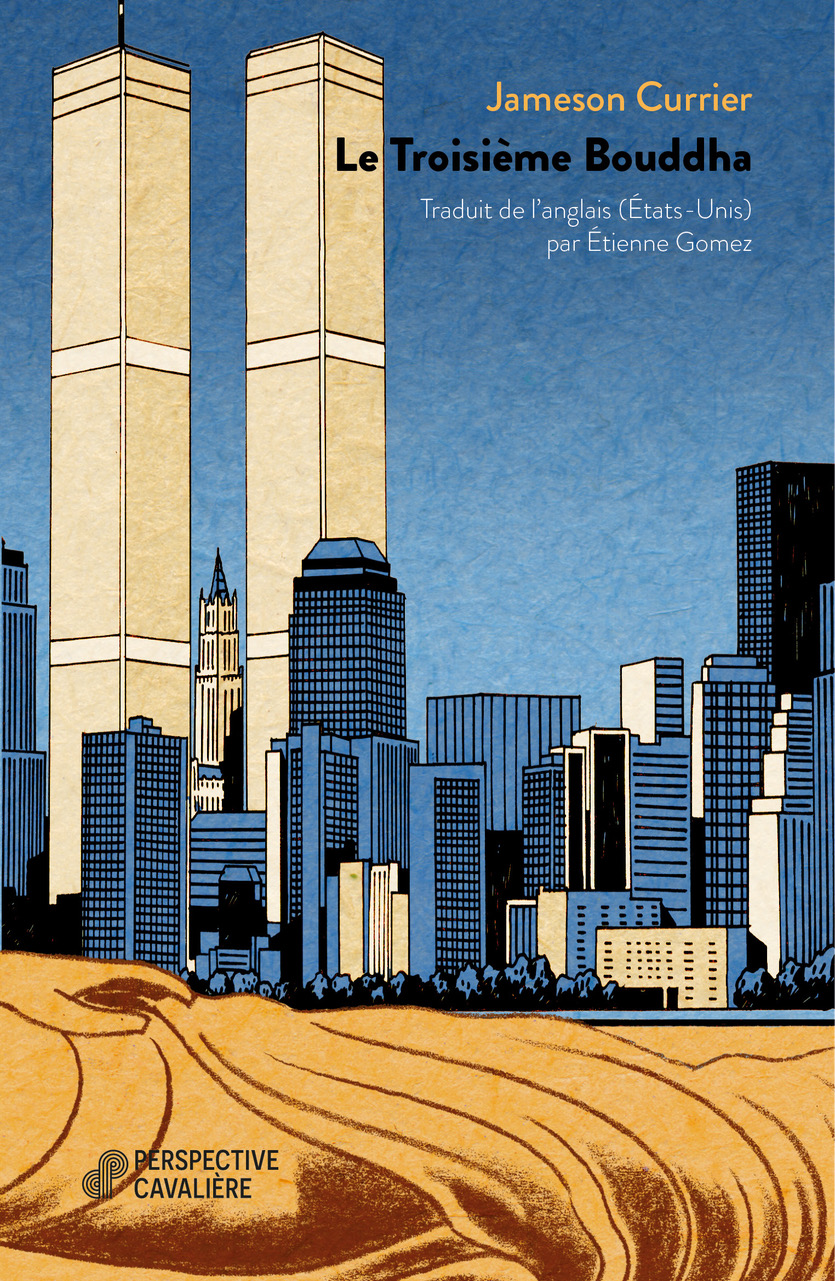
Le Troisième Bouddha, the French translation of my novel, The Third Buddha, about the aftermaths of 9/11 on the intersecting lives of a group of gay men in New York and Afghanistan, was awarded the “Prix du Roman Gay” in 2022. The French translation is by Étienne Gomez and the novel is the first book to be published by Perspective Cavalière, a new press in France founded by Étienne. Étienne Gomez also received a Prix du Roman Gay as the publisher of Perspective Cavalière.
I am grateful to Étienne for his courage to launch a new gay press and fortunate for his wonderful translation.
For those who have not read the novel, the English language print and ebook editions of The Third Buddha, published by Chelsea Station Editions, are still in print and available through retailers.
